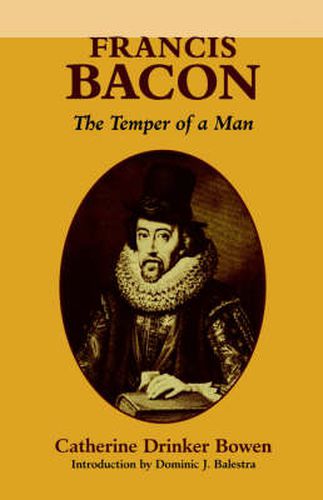Readings Newsletter
Become a Readings Member to make your shopping experience even easier.
Sign in or sign up for free!
You’re not far away from qualifying for FREE standard shipping within Australia
You’ve qualified for FREE standard shipping within Australia
The cart is loading…






The portrait Bowen paints of this controversial man, Francis Bacon (1561-1626), balances the outward life and actions of Bacon with the seemingly contradictory aspects of his refined philosophical reflections. When Bacon’s more notorious attributes are set in historical context, his actions seem less personally vindictive against the backdrop of an entire age seemingly devoted to the very vanity and ingenuousness with which he is so often accused. As Lord Chancellor of England, Bacon was impeached by Parliament for taking bribes in office, convicted, and banished from London an the law courts. In a prayer Bacon composed during the interval following his punishment, he reveals that the dichotomy of his existence was no more deeply felt than by himself, and he readily admits that his obligations to society were not as suited to his nature as the study of philosophy, science and law. Modem scholars hold Bacon’s philosophical works, Novum Organum , Advancement of Learning and New Atlantis as his greatest achievements. Bowen’s story reveals a man whose genius it was not to immerse himself in the rigour of scientific experimentation, but to realise what questions science should ask, and thereby reach beyond the status quo and appeal to the wider imagination of his generation. In his writings, Bacon challenged established social and religious orders, raised questions about mind/body relation and the role of dreams, and foresaw the day when scientists at colleges and universities would share experimentation. It is Bacon’s legacy to have gone beyond his age and, out of pure intuition, anticipate the concerns of future generations.
$9.00 standard shipping within Australia
FREE standard shipping within Australia for orders over $100.00
Express & International shipping calculated at checkout
The portrait Bowen paints of this controversial man, Francis Bacon (1561-1626), balances the outward life and actions of Bacon with the seemingly contradictory aspects of his refined philosophical reflections. When Bacon’s more notorious attributes are set in historical context, his actions seem less personally vindictive against the backdrop of an entire age seemingly devoted to the very vanity and ingenuousness with which he is so often accused. As Lord Chancellor of England, Bacon was impeached by Parliament for taking bribes in office, convicted, and banished from London an the law courts. In a prayer Bacon composed during the interval following his punishment, he reveals that the dichotomy of his existence was no more deeply felt than by himself, and he readily admits that his obligations to society were not as suited to his nature as the study of philosophy, science and law. Modem scholars hold Bacon’s philosophical works, Novum Organum , Advancement of Learning and New Atlantis as his greatest achievements. Bowen’s story reveals a man whose genius it was not to immerse himself in the rigour of scientific experimentation, but to realise what questions science should ask, and thereby reach beyond the status quo and appeal to the wider imagination of his generation. In his writings, Bacon challenged established social and religious orders, raised questions about mind/body relation and the role of dreams, and foresaw the day when scientists at colleges and universities would share experimentation. It is Bacon’s legacy to have gone beyond his age and, out of pure intuition, anticipate the concerns of future generations.